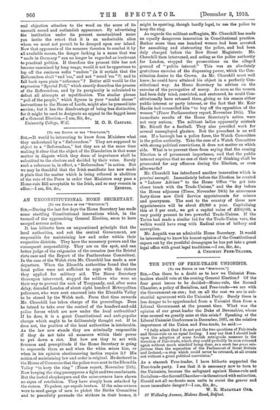AN UNCONSTITUTIONAL HOME SECRETARY.
[TO TICE EDITOR OP THE " SPECTATOR:9
Sin,—During the last few days the Home Secretary has made some startling Constitutional innovations which, in the turmoil of the approaching General Election, seem to have escaped serious notice.
It has hitherto been an unquestioned principle that the local authorities, and not the central Government, are responsible for maintaining law and order within their respective districts. They have the necessary powers and the consequent responsibility. They are on the spot, and can better judge of the exigencies of the occasion (see the Bristol riots case and the Report of the Featherstone Committee). In the case of the Welsh riots Mr. Churchill has made a new departure. When the Rhondda authorities found that the local police were not sufficient to cope with the rioters they applied for military aid. The Home Secretary thereupon intervened, stopped the soldiers who were on their way to prevent the sack of Tonypandy, and, after some delay, denuded London of about eight hundred Metropolitan policemen, who were sent unarmed into the Rhondda Valley to be stoned by the Welsh mob. From that time onwards Mr. Churchill has taken charge of the proceedings. Does he intend to take over the control of the hundred-and-odd police forces which are now under the local authorities P If he does, it is a great Constitutional and anti-popular change which ought to be deliberately thought out. If he does not, the position of the local authorities is intolerable. As the law now stands they are criminally responsible if they do not take all measures within their power to put down a riot. But how are they to act with firmness and promptitude if the Home Secretary is going to supersede them as and when the whim seizes him, or when in his opinion electioneering tactics require it ? His notion of maintaining law and order is original. He declared in the House of Commons that the police were sent to the Rhondda Valley "to keep the ring" (Times report, November 25th). Now keeping the ring presupposes a fight and two combatants. But the looted shopkeepers and the mine-owners have shown no signs of retaliation. They have simply been attacked by the rioters. Tupulsas, ego vapulo tantuni. If the mine-owners were to send gangs of men to picket the Strike Committee and to peacefully persuade the strikers in their homes, it
might be sporting, though hardly legal, to use the police to keep the ring.
As regards the militant suffragists, Mr. Churchill has made an equally dangerous innovation in Constitutional practice. Rather more than one hundred women had been arrested for assaulting and obstructing the police, and bad been duly charged before the Bow Street ltfagistrate. Mr. Churchill then intervened, and acting as the police authority for London, stopped the prosecutions on the alleged ground of "public interest." This was an absolutely gratuitous exercise of the dispensing power, which the Con- stitution denies to the Crown. As Mr. Churchill must well know, he could have attained his object in a perfectly Con- stitutional way. As Home Secretary he advises on the exercise of the prerogative of mercy. As soon as the women had been duly tried, convicted, and sentenced, he could Con- stitutionally have released them, giving as his reason either public interest or party interest, or the fact that Mr. Keir Hardie had counselled him "to buy off the opposition of the women" (Times Parliamentary report, November 19th). The immediate results of the Home Secretary's action were not very serious. The militant ladies apparently mistook Mr. Birrell for a football. They also provided work for several unemployed glaziers. But the precedent is an evil one. If a borough has a police force, the Watch Committee is the police authority. Take the case of a Watch Committee with strong political convictions, it does not matter on which side. What is to prevent them from saying that the coming Election is of paramount importance, and that the public interest requires that no one of their way of thinking shall be prosecuted for any offences during the Election, or even afterwards ?
Mr. Churchill has introduced another innovation which is pessimi ezempli. Immediately before the Election he created a "Labour Adviser" to the Home Office "to get into closer touch with the Trade-Unions," and the day before the House adjourns (Times, November 24th) he announces forty-three new Civil Service appointments for miners and quarrymen. The cost to the country of these new appointments will be about £9,000 a year. Capitalising this at 3 per cent., we get a capital value of £300,000, a very pretty present to two powerful Trade-Unions. If the Tories had made a similar bid for the Trade-Union vote, the welkin would have rung with Radical cries of bribery and corruption.
Mr. Asquith was an admirable Home Secretary. It would be interesting to know his honest opinion of the Constitutional capers cut by the youthful demagogue he has put into a great legal office with great legal traditions.—I am, Sir, &e., A. UNIONIST FUZE-TRADER.










































































 Previous page
Previous page